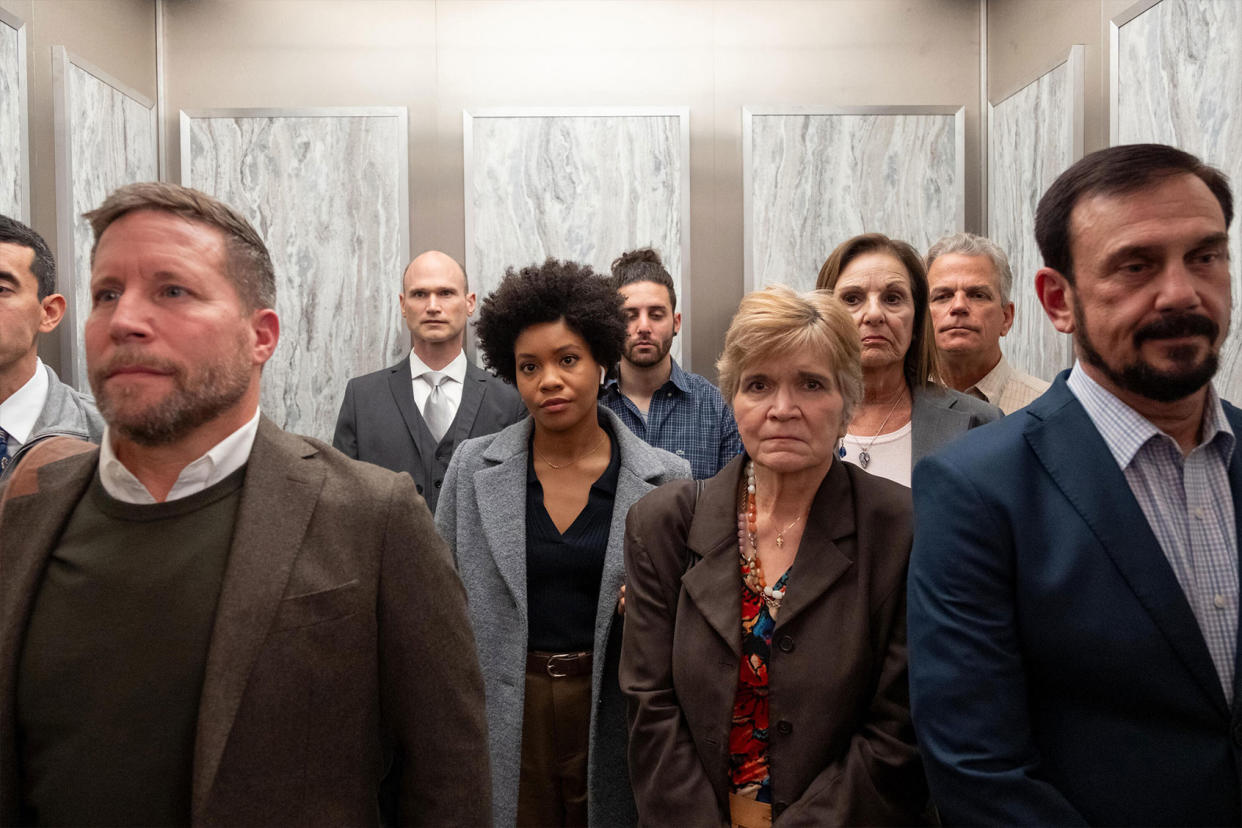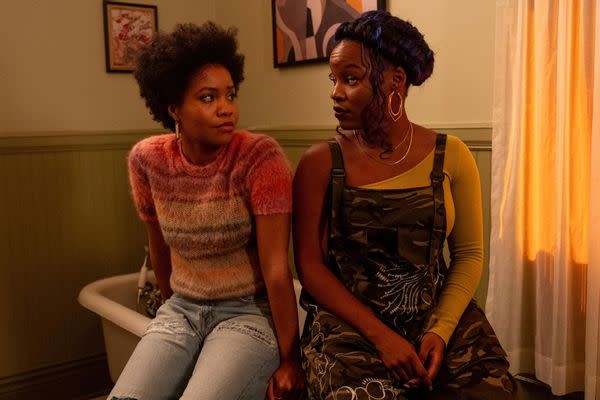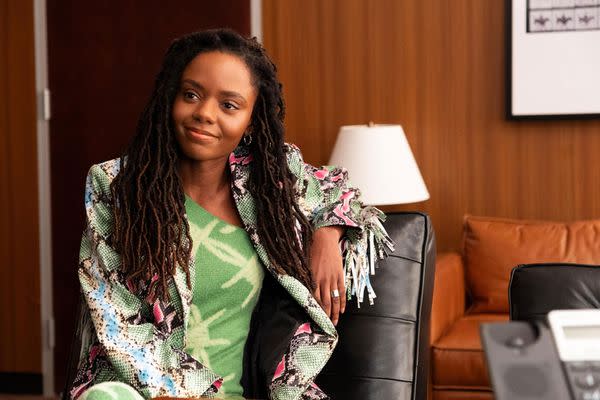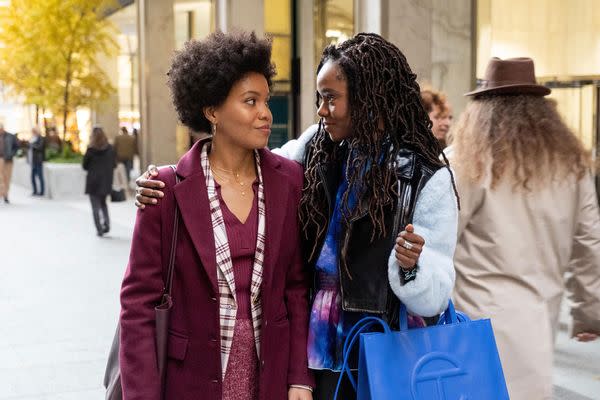"The Other Black Girl" peeks into the hidden horrors of being the only person of color at the office

Early scenes in "The Other Black Girl" place us inside the ever-present anxiety Nella Rogers (Sinclair Daniel) experiences at work. As one of two non-white staffers at Wagner Books, a prominent New York publisher, Nella is accustomed to it.
She senses its shudder behind every interaction with her boss Vera (Bellamy Young). She can barely suppress its irritating buzz whenever her socially clumsy co-worker Sophie (Kate Owens) uses her as a test audience for her shallow journeys in allyship. She pretends it isn't singing in her ears when she's surrounded in the elevator or sidelined in meetings. But its constant low-volume screech reminds her and us that she's always being watched, always one slip-up from being sent packing.
Zakiya Dalila Harris' debut novel, the basis for Hulu's 10-episode series, accurately captures the stress of working while Black in a primarily white industry because she's lived it. Nella's travails are based on scenes from Harris' three-year stint in Knopf Doubleday's editorial department, but any non-white worker who's either the only or one of few in their department may recognize her cheerful strain.
The premiere, which the author co-wrote with executive producer Rashida Jones, contains the series' most poignant distillation of this stress. Daniel's expressive performance welcomes the audience to flinch as she yanks between baseline honesty and the overwrought pep forcing Nella to chirp whenever Vera flings a task at her.
Only when she completely relaxes around her best friend Malaika (Brittany Adebumola) or her boyfriend Owen (Hunter Parrish) can we see how exhausting it is to constantly be on. But anyone who's been in her place knows why she has to keep that switch flipped. If her white co-workers find Nella to be intimidating, her advancement will be limited; also, should she be grateful to have a job most people in her position would kill for?

All this is foregrounded before Nella meets her new co-worker Hazel-May McCall (Ashleigh Murray), the titular replacement for Nella's outgoing colleague. Nella celebrates Hazel's hire, viewing it as proof that Wagner is finally living up to its promise to prioritize diversity after years of empty gestures.
Hazel immediately allows Nella to let her guard down – infusing a knowing purr of "girl" into exchanges where she urges Nella to "spill the tea." They even love the same book, "Burning Heart," which is what attracted both to Wagner. It was edited by the author's best friend, Kendra Rae Phillips (Cassie Maddox) who was also the only Black person to rise that high in the company since 1983. That's also around the time that Kendra disappeared.
Given their common goals, Hazel assures Nella that she has her back. But does she? Not long after Hazel arrives, Nella finds a strange note that reads "LEAVE WAGNER NOW." The weirdness escalates from there.
Sometime over the past decade, it was decided that every horror flirtation must have metaphorical significance. It's a philosophy that is more effective in some cases than others, with the line dividing success and failure narrowing down to degrees of subtlety.
That term does not accurately describe "The Other Black Girl," but the story is infuriatingly familiar to people of color who gain entry to white spaces. Being Black and alone in those environments, whether it's school, work or social situations, attracts assumptions about your fitness to be there regardless of your qualifications.
If you are the first – or, like Nella, the first in a long, long time – you'll likely burn a lot of energy working twice as hard for a shot at a promotion. You tell yourself you're doing this in part so that the next person who looks like you will have it easier.
But what if that person for whom you've paved the way arrives while you're still at or near the starting line — and pits themselves against you?
Nella is an editorial assistant gunning for an assistant editor position, so she stays late, brings her work home with her, and comes up with ideas Vera takes credit for.
Hazel is culturally savvy and eager to ingratiate herself. She also satisfies her white co-workers' yearning to crib parts of the Black experience, cheerfully bringing in pastries from a Harlem bakery or tying scarves in her locs. Their boss Richard Wagner (Eric McCormack) takes a shine to her immediately.

Shortly after she joins the company, Nella offends Wagner's star writer Colin Franklin (Brian Baumgartner) by sharing honest feedback about his book. Franklin, a white man, cooks up a Black female drug addict named Shartricia in his new novel, and Nella correctly warns her boss that it's a PR disaster waiting to happen. But Vera doesn't want to hear it – and neither does Franklin.
Of course, Nella only shares her thoughts at Hazel's urging, promptly leaping from the solidarity car before it plummets off a cliff.
If you've seen "Single White Female" or any Lifetime movie from the '90s or early aughts you may be able to guess where the plot heads. But you'd only be partially correct since the turn emulsifies the supernatural into the ludicrous.
In this, "The Other Black Girl" follows the book's trajectory by transforming from a realistic portrayal of workplace double standards and the emptiness of inclusion pledges into a conspiracy braiding Wagner's legacy with the politics of Black hair.

It's bizarre enough of a device to get points for uniqueness, aided by the show's designation as a comedy thriller hybrid. But there's a threshold at which Harris' original point is blunted – it happens around five or six episodes into the season. The office space gaslighting gives way to horror trickery, slackening the plot's tension until it nearly unravels in the final act. Somehow Harris' denouement is more fun on the page than the screen.
Want a daily wrap-up of all the news and commentary Salon has to offer? Subscribe to our morning newsletter, Crash Course.
Still, the author takes advantage of her series adaptation to expand Hazel's humanity beyond the novel's profile, and Murray's portrayal strengthens the character empathetic traits. She ensures Hazel is always genuinely likable, even after her mask begins to slip, which assists the plot's approximation of its Jordan Peele-style twist. If only the story scaffolding supporting it were as elegant as it is in similar social allegories such as "Get Out" – which is a tall order, I'll admit.
Provided you can relax into the camp vibe once the suspense kicks into gear, "The Other Black Girl" is an easy binge that highlights its talent, especially Adebumola's ample comedic timing. You'll want to see her in more projects, along with appreciating Garcelle Beauvais' strutting performance as "Burning Heart" author Diana Gordon. After stealing the spotlight in "Survival of the Thickest," watching Beauvais chew new scenery is dessert.
That Netflix show offers comforts "The Other Black Girl" refuses to, but each is validating in its own way. This one assures people who have been in Nella's position that they aren't insane even as threats around her grow increasingly crazy. Whether that's enough to merit a second season is a note yet to be written.
All episodes of "The Other Black Girl" are streaming on Hulu.